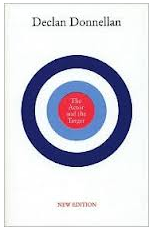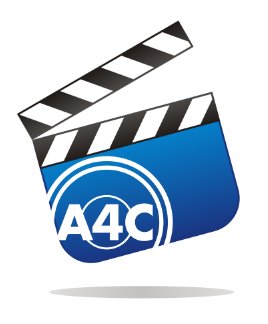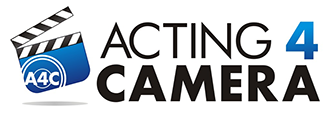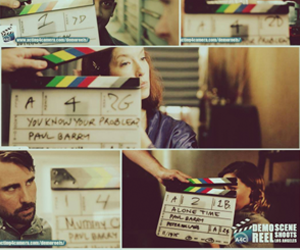by Paul Barry
 In Declan Donnellan’s insightful book, The Actor and the Target (yes, my clients are getting sick of hearing about it), he speaks of ‘unuseful truths’. Unuseful truths are the things we say that contain some grain of a moral, but are actually not useful to us in practical terms.
In Declan Donnellan’s insightful book, The Actor and the Target (yes, my clients are getting sick of hearing about it), he speaks of ‘unuseful truths’. Unuseful truths are the things we say that contain some grain of a moral, but are actually not useful to us in practical terms.
‘A watched pot never boils’ would be an example, in the kitchen. A watched pot does boil, but of course we understand the lesson behind it, which is one of practicing patience. When it comes to implementing it in the field though, a watched pot boils just as quickly (or slowly) as an unwatched pot. Hence, it qualifies as an ‘unuseful truth’.
Below are a number of unuseful truths I have heard repeatedly from acting teachers and directors the world over. It’s time to reject them in favour of something more practical. Something useful. Let’s see how many you recognize….
On stages with a clear ‘fourth wall’ (the imaginary boundary between actor and audience), we often receive the direction to ‘play it out’. The practical purpose of this unuseful truth is so that the audience can both see and hear what we are doing. The implication being that the audience is blind and deaf to an actor not facing the them one hundred percent of the time. This clearly qualifies as an unuseful truth, since in life we often have conversations to the backs of people, and oftentimes they are even in a completely different room. So why is the ‘play it out’ myth perpetuated? Well, there are times when the audience can miss an important line or moment, which clearly would not be a good thing, but is the only solution to ‘play it out’? Of course not. In the absence of a more appropriate choice, it seems to be the most prudent solution. I believe you know this is not a great solution. I believe you feel slightly ripped off every time you are asked to do it. I believe the only reason we are asked to do it is when the director or teacher lacks the requisite imagination to build the set, devise the blocking and structure the line delivery in such a way that the audience cannot miss important moments, even if they try. ‘Play it out’ is one of countless generic and generalised directions actors struggle with on a daily basis. They do so needlessly. It’s time to throw it away in favour of something useful. Recently I wanted an actor on screen to remain facing forward when her instincts screamed for her to turn to the other actor. We only had time for a two-shot and I needed to cover the action from this one angle. I also wanted her to have a private moment, which facing the other actor would have negated, so instead of telling her to ‘play it out’, I told her not to let the other character see her face. If her boss could see her face she would know how upset she was. Bingo. The moment was played out and worked a treat. Replacing generalised direction with specific action should always be the aim.
If I tell you to ‘trust me’, can you do it? Lend me your car, I promise you’ll get it back unscathed. Let me date your younger sister, you can trust me *cough cough*. Trust is developed after a series of eventualities result in more positive than negative outcomes. For some, trust is given when the positives reach 51%, others not until they reach 100%. Either way, trusting yourself is subject to exactly the same considerations. Does your hand trust your brain when it says the hotplate has gone cold? Telling an actor to ‘just do it’ would be far more useful, as long as the ‘it’ was clearly defined and ‘do-able’. As a result, they would see for themselves if the blocking, direction or technique resulted in a productive/pleasing/desirable outcome, after which they can now trust that they can do it again. Now, if an actor relies exclusively on the approval of the teacher or director then it is an impossibility to trust themselves. At best they can trust the teacher, worst case, they will never feel confident in a play, TV show, film or audition where they are on their own. It is entirely true that we should ‘trust ourselves’, but simply being told to do so is like telling someone to ‘feel good’. It is at best an unuseful truth; at worst, an impossibility.
Though it may be true, this observation is both unuseful and completely destructive. No actor in the world has ever become better by repeatedly hearing that they are ‘too in their head’. It is essential to understand that your lungs would not inflate without your brain telling them to do so. Your heart would not beat, your eyelids wouldn’t blink and your bowels would have no ability to resist the urge to evacuate every ten minutes, without your brain feeding very specific instructions. The everyday functioning of your body requires the regular instructions only your brain can provide. And your brain is completely in your head. Beyond the purely physiological, solving problems, appreciating an artwork and falling in love would all be impossible without being processed by the brain. Though the senses feed information to the brain, it is impossible – and far from recommended – to disconnect your grey matter altogether. In recent decades though (can we blame the 60’s, 70’s and 80’s?) there has been an attack on the brain, and a backlash against science, psychology, intelligence, and consciousness, generally. In acting circles it is particularly pronounced because so many unskilled, unqualified and unknowledgable instructors found the need to describe what they did (or wanted) but simply didn’t know how. This was the birth of the so-called metaphysical. Or as I like to call it: ‘That which you cannot control’. Just as the weather affects me but I can’t change it, anything I can’t define and control is more than welcome – even invited – but not to be relied upon. ‘Being in one’s head’ is merely self-consciousness. Instead of offering an actor something to do (after all, to act is to do) to counteract a perceived self-consciousness, it became popular and commonplace to advocate the decapitation of the actor altogether. ‘Get out of your head’, get it in your body’, ‘stop thinking’, ‘embody it’. We’ve heard these generalisations repeatedly, and they have never helped. If you are reading this and disagreeing I would encourage you to research ‘confirmation bias’ because you may just suffer from it. The only way to combat self-consciousness – because that’s what ‘being in your head’ actually is – is to counteract it with an even stronger attention on something else. Public speakers are told to imagine the audience in their underwear, because – fail or succeed – it takes the focus off their nerves and fear, placing it squarely on something else. Anything else. And it works. I’m picturing you in your underwear right now, and I feel great.
 ‘Relax/ Enjoy yourself/ Have fun’
‘Relax/ Enjoy yourself/ Have fun’
Have you ever gone to a party that you really didn’t want to attend, and as the night goes on it only gets worse when your friends keep saying: ‘relax’, and ‘you should just enjoy yourself’? You can no sooner ‘enjoy yourself’ by listening to their advice than you can control your temper by being told to ‘you shouldn’t be so angry‘. I guarantee every single one of us has eventually enjoyed ourselves at even one night we initially detested, but it had nothing to do with our friends’ (well-intentioned) advice. When something happens to make the night enjoyable or someone does something that we enjoy then we enjoy ourselves. Otherwise, our feelings remain the same. That’s not to say we can’t employ techniques to make ourselves enjoy an event, but that takes the act of doing something enjoyable as misdirection. Enjoyment is the glorious result of doing and experiencing great things. Discontentment is it’s unhappy sibling.
 ‘Take chances/ Take risks/ Be bold’
‘Take chances/ Take risks/ Be bold’
Right now I want you to take a risk. Do something you’ve never done before. Try something different. Go! Don’t worry, I’ll wait…………… ……………………………………
So. What did you do? Did you really do something you’d never done before? Was it bold? How was it risky, exactly? Did you climb into a full bathtub with your toaster and plug it into the power outlet? Perhaps you stuck chili up your nose and squirted lighter fluid in your eye, whilst smoking Ice. More likely than anything else you either ignored my instruction and just kept reading or sat blankly staring at the screen for a few moments, before starting to read again. Without knowing certain parameters, an actor ‘taking a risk’ on stage or screen is a kid in a giant toy store. Where does one begin? It would be risky to slap the other actor. It would be dangerous to push them into the front row of the audience. A bold choice would be to come on naked with ‘I love Justin Bieber’ tattooed on your buttocks. Are these likely to elicit the kind of response you want from the audience? Who knows. The fact is, each one of these choices is a gamble more likely to result in pain or embarrassment, when the payoff (the reason why we do anything) is entirely uncertain. Would you ‘risk’ twenty thousand dollars on a business when the added potential loss is to your reputation as an entrepreneur? It is insulting to intimate that our ego, pride, and self-worth as an actor are any less valuable that twenty thousand dollars. The fact is, if you want someone to take a risk, you have to make the risk worth taking. People don’t invest millions of dollars in the screenplay you have tucked in your sock drawer because they don’t believe they’ll make their money back. Why should you ‘take a risk’ with your emotions if you don’t believe you will receive an appropriate return on your investment? Telling someone to: ‘enjoy yourself’ cannot force a result, and similarly, ‘risk-taking’ can only be achieved by dangling a carrot in front of someone. The reason this works is because a carrot is specific. A carrot is a quantifiable, tangible, achievable result. Swap the carrot for an objective, or the carrot for destination, and the actor has something worth chasing. If you are specific enough about what you hope to get in the end – an objective/ goal/ desire/ want/ need – even if you fail in the attempt, or head off on a tangent in the process, the instruction to ‘take a risk’ will at least have some guidance. You may not stick to your Google Maps instructions on how get to Brazil, but if you get off track along the way, you can always pull out the GPS and recalibrate.
What’s eight minus two? Is it nine? OK. So less is not more. Moving on. This is the most pernicious of all ‘unuseful truths’ because it presupposes that anything ‘big’ is bad. Most of Johnny Depp’s choices have been labeled as ‘too big’ by anyone except the hundreds of millions of people who enjoy his performances. Meryl Steep’s wig, accent and dentures in the Iron lady would be considered laughable, if it were not for the fact that Margaret Thatcher actually looked and spoke as preposterously as that in reality. I guarantee that many teachers and directors would tell Depp and Streep that ‘less is more’ if they had them as unknown actors in a class today. The ‘Less is more’ philosophy advocates throwing the baby out down the sink after a bath, simply because the water is dirty. The problem is that many instructors have no skill at separating what works from what doesn’t. The result: throw it all away and hope it improves. Sadly, when an actor follows the less is more instruction, the ‘bad’ seems to disappear, whilst the ‘good’ seems to shine through. Once again I’d encourage you to research ‘confirmation bias’ for the reason why this can sometimes be the case. When you are told ‘less is more’ what you are actually being told may be: ‘You are moving your arms a lot and I can’t work out why’, ‘There is no tension because you keep rocking from side to side’ or simply, ‘I don’t believe you’,. It’s not necessarily that the viewer doesn’t believe everything that you’re doing, just something that you’re doing. Less something may be more something else, sure. But without knowing what that something is, ‘less is more’ is just throwing the baby out with the bathwater…
At first glance, this one would seem to be fairly innocuous. How can ‘picking up the cues’ possibly hurt your performance. Well, in many ways. If you were ambling along the street with poor posture, instructing you to ‘pick up the pace’ will do nothing to improve your gait. If anything, it will make your idiosyncratic shuffling even more pronounced. A personal trainer who encourages you to complete your reps in the gym faster, without first checking your form, may very well be visiting you tomorrow at the chiropractor. Form is everything. If the form is inefficient, then speeding things up is a recipe for disaster. Slowing it down is exactly the same. How many times can you honestly – honestly, mind you – say that ‘picking up the cues’ improved the performance? Did you ask every audience member? Did they also see it when the cues weren’t picked up? Are you certain those who enjoyed it weren’t enjoying an entirely different aspect of the performance altogether? From the mouth of a director or teacher with intimate knowledge of perfect form, this is sometimes great advice, but it should never come without strict attention paid initially to it. ‘Picking up the cues’ before perfecting the form is – to use another analogy – putting the cart before the horse.
*Sigh*
This one really gets my goat. It is true that usually an actor standing in the one place for forty minutes can be pretty boring. But not necessarily. I have seen shows where incredible actors onstage have not moved one inch for up to that length of time and remained fascinating. Yes, on stage. On the flipside, I have seen countless actors over the years ‘using the space’ when there was absolutely no purpose whatsoever for it, to disastrous effect, for in no way did it serve the story, and in many cases it had entirely the opposite effect. Do you ‘use the space’ in your living room? What about behind the couch? Do you ‘use the space’ in your car? The bit between the back seat and the rear window? What about your bedroom? I know there’s space under my bed that I will never use, but that’s because I’m a human being, not the Boogeyman. What exactly is expected of you when you are encouraged to ‘use the space’? The problem is, no-one knows. And what are you ‘using the space’ as? Use the space, take a risk, a bird in the hand is worth two in the bush; the hits just keep on coming….
OK. I want you to listen to this:
I was walking down the street today and I stopped out the front of a bank. The door was closed and I thought it may have been locked, but when I pushed it I noticed it was open, so I went in. The first thing I saw was a security guard shaking his head. ‘We’re closing up’, he grumbled. I went to leave but he looked at his watch and suddenly changed his tune. ‘Oh wait, you’ve got five minutes.’, he said as he stepped aside. ‘Thank you!’ I shouted as I rushed up to the nearest teller and asked to make a withdrawal. They counted the notes out and it seemed to take forever, as the guard began tapping his baton on the door to speed the process up. So now I have $500 in my wallet. To give to my dying aunt for her operation….
Now I want you to adopt the objective to get a thousand dollars from me and read the story again, raising your hand as you get closer to it, and lowering it as you get further away. Once again, I’ll wait…… ……………………………………………………………
Now you’re listening. Hearing words without knowing what you want is like pretending to be interested in someone on a date when you’re not attracted to them. Close, but no cigar.
Right now I want you to not go with your gut. Try it. Pick up a piece of text and do not, under any circumstances, go with your gut. Telling an actor to go with their gut, think it through or really feel it, is a redundant exercise. Since it is impossible to not go with your gut, to not think, or to not feel, the instruction lacks specificity at least, but usually results in producing more harmful results than it does good.
When you next encounter an unuseful truth – and unfortunately, you will – encourage the director, teacher or casting director to lend you a more concrete idea of what they’re after. If they reply with something useful, fantastic, but if they don’t, simply translate it into something you can do. Remember, to ACT is not to feel, to emulate, or to manifest, it is to DO.
Paul Barry is an actor, director, writer, teacher and blogger. He co-owns Acting 4 Camera and Showreels Australia. He lives in LA, but regularly teaches via Skype, all around the world.
You may also like:
10 New Year’s Resolutions For Actors
10 Things For Actors To Stop Saying
(The blogs you see on www.acting4camera.com are free, but they don’t write themselves. If you find the information useful, feel free to donate below to keep them coming. Your contribution of any amount is graciously welcomed!)
















Follow Us!